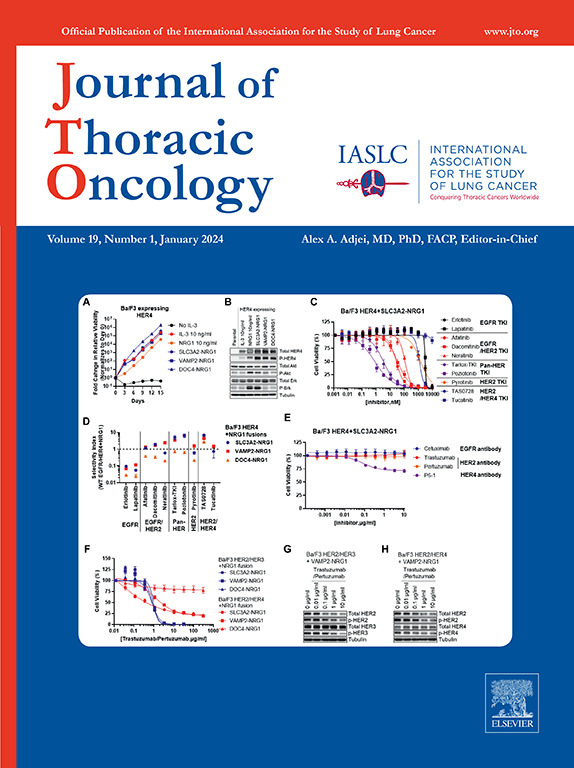早期非小细胞肺癌手术前ctDNA检测的临床实用性
IF 21
1区 医学
Q1 ONCOLOGY
引用次数: 0
摘要
目的:主要由于组织获取受限和周转时间延长,早期患者手术前使用肿瘤信息循环肿瘤DNA(ctDNA)检测受到限制。本研究旨在评估基于甲基化的无细胞DNA检测法在一大批切除的非小细胞肺癌(NSCLC)患者中的临床价值:我们分析了895名表皮生长因子受体(EGFR)和ALK-wild型、临床I期或II期NSCLC患者的手术前血浆样本。评估了ctDNA状态与肿瘤体积、代谢活性、组织学、组织学亚型和临床病理TNM分期的关系,以确定其预后意义:结果:在414例临床I期肺腺癌(LUAD)患者中,有55例(13%)在手术前检测到ctDNA,且与无复发生存率(RFS)相关(2年RFS为69%对91%;log-rank PC):这些研究结果支持将ctDNA检测纳入早期NSCLC的常规诊断流程,而无需进行肿瘤组织分析。此外,ctDNA检测在临床上还有助于鉴别可能从创新治疗(包括新辅助免疫检查点抑制剂)中获益的高危患者。本文章由计算机程序翻译,如有差异,请以英文原文为准。
Clinical Utility of Tumor-Naïve Presurgical Circulating Tumor DNA Detection in Early-Stage NSCLC
Objectives
The use of tumor-informed circulating tumor DNA (ctDNA) testing in patients with early-stage disease before surgery is limited, mainly owing to restricted tissue access and extended turnaround times. This study aimed to evaluate the clinical value of a tumor-naïve, methylation-based cell-free DNA assay in a large cohort of patients with resected NSCLC.
Method
We analyzed presurgical plasma samples from 895 patients with EGFR and anaplastic lymphoma kinase-wild-type, clinical stage I or II NSCLC. The ctDNA status was evaluated for its prognostic significance in relation to tumor volume, metabolic activity, histologic diagnosis, histologic subtypes, and clinical-to-pathologic TNM upstaging.
Results
Presurgical ctDNA detection was observed in 55 of 414 patients (13%) with clinical stage I lung adenocarcinoma (LUAD) and was associated with poor recurrence-free survival (2-year recurrence-free survival 69% versus 91%; log-rank p < 0.001), approaching that of clinical stage II LUAD. Presurgical ctDNA detection was not prognostic in patients with clinical stage II LUAD or non-LUAD. Within LUAD, tumor volume and positron emission tomography avidity interacted to predict presurgical ctDNA detection. Moreover, presurgical ctDNA detection was predictive of the postsurgical discovery of International Association for the Study of Lung Cancer grade 3 tumors (p < 0.001) and pathologic TNM upstaging (p < 0.001). Notably, presurgical ctDNA detection strongly correlated with higher programmed death-ligand 1 expression in tumors (positive rates 28% versus 55%, p < 0.001), identifying a subgroup likely to benefit from anti–programmed death-ligand 1 therapies.
Conclusion
These findings support the integration of ctDNA testing into routine diagnostic workflows in early-stage NSCLC without the need for tumor tissue profiling. Furthermore, it is clinically useful in identifying patients at high risk who might benefit from innovative treatments, including neoadjuvant immune checkpoint inhibitors.
求助全文
通过发布文献求助,成功后即可免费获取论文全文。
去求助
来源期刊

Journal of Thoracic Oncology
医学-呼吸系统
CiteScore
36.00
自引率
3.90%
发文量
1406
审稿时长
13 days
期刊介绍:
Journal of Thoracic Oncology (JTO), the official journal of the International Association for the Study of Lung Cancer,is the primary educational and informational publication for topics relevant to the prevention, detection, diagnosis, and treatment of all thoracic malignancies.The readship includes epidemiologists, medical oncologists, radiation oncologists, thoracic surgeons, pulmonologists, radiologists, pathologists, nuclear medicine physicians, and research scientists with a special interest in thoracic oncology.
 求助内容:
求助内容: 应助结果提醒方式:
应助结果提醒方式:


